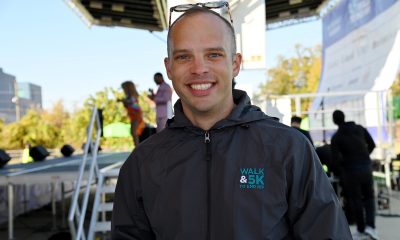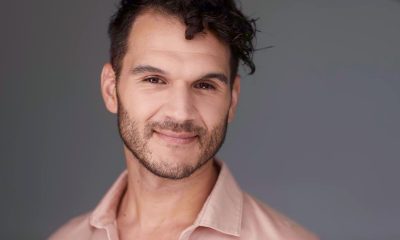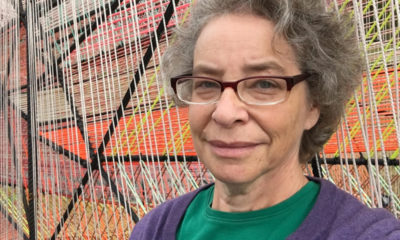Books
Nonbinary poet unmasks society’s gender expectations in new collection
Karen Poppy’s ‘Diving At The Lip Of The Water’ debuts next week
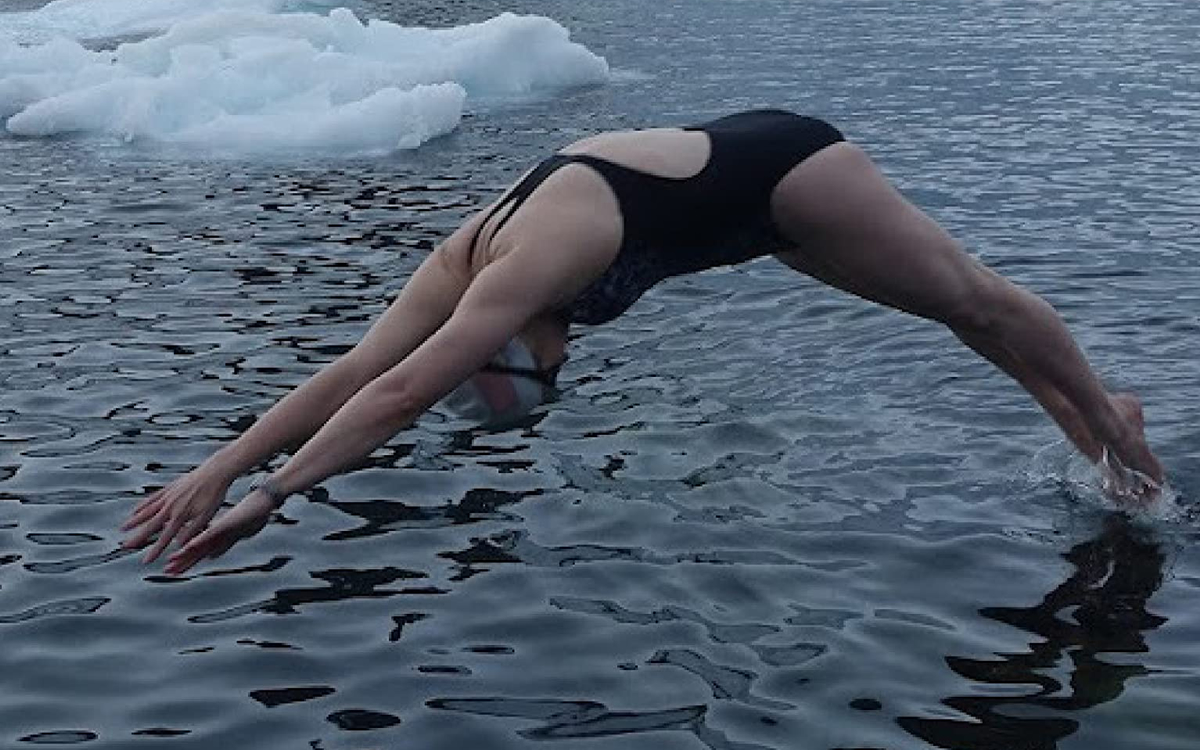
“I started to compose poetry around the age of three – before I could even write,” poet Karen Poppy, 47, told the Blade in a telephone interview. “My Mom would write my poems down.”
“I had the good fortune,” added Poppy, whose first, full-length poetry collection “Diving At The Lip Of The Water” will be out from Beltway Editions, a Washington, D.C. area press, on May 1, “My Mom read poetry to me. The first poem was about a nightingale. Maybe she read Keats to me.” (John Keats was the 19th century Romantic poet who wrote “Ode to a Nightingale.”)

Poppy has written a book “that will rough a reader up and then wrap their scraps in silk,” poet Francesca Bell has said of “Diving At The Lip of The Water.” For Poppy, who identifies as queer, nonbinary, lesbian and an artist, coming out has been a lifelong process. “I’ve come out many times in many ways,” Poppy, who grew up in Foster City, Calif., and now lives in the San Francisco Bay area, said.
April is National Poetry Month. In every month, Poppy thinks often of Walt Whitman, one of the United States’ greatest poets. Thought by many to be queer, Whitman, a nurse in Washington, D.C. during the Civil War, is best known for his groundbreaking work “Leaves of Grass.”
Whitman comes to mind to Poppy when she talks about her identity. “As an artist,” Poppy said in reference to how she identifies, “I’m everyone and everything.”
When Whitman talks about the self containing “multitudes,” “He’s not just speaking of individuals,” Poppy said, “he’s saying that poets-artists enter into everything.”
“As an artist – a poet,” Poppy said, “I don’t like to be put into boxes.”
Poppy celebrates Whitman’s creative spirit, refusal to have limitations placed on him and, what she called, “his joyous experience of limitlessness and connectivity with everything.”
As a young child, Poppy sensed that she was different. “I knew very early on,” she said, “I wanted to be like my mother and my father.”
She wanted to be glam like her mom. “My Mom’s family’s nickname for Mom was Miss America,” Poppy said.
She wore her Dad’s leather jacket, cowboy hat and cowboy boots. “Early on, I got in trouble for trying to smoke a cigarette,” Poppy said, “I put it in the wrong way. I was lucky I didn’t burn my mouth!”
“I cut my mouth, trying to shave as a toddler,” she added, “I was already creating my own gender identity.”
At a time, when people were far less out and proud than now, Poppy crushed on her girl babysitters. “In kindergarten, I got in trouble with my best friend at the time,” she said, “because I told her that I was interested in her physically.”
“I think she was very kind about it,” Poppy added.
That same year, Poppy was reprimanded by her teacher for kissing a boy. “The boy and I were in line waiting to go back to the classroom,” she said, “he kissed me back.”
During that era, Poppy didn’t have the words to name or describe her feelings. “I have a gay cousin who’s older than me,” she said, “and a lesbian aunt. But because they weren’t exactly the way I am, I didn’t realize I was queer, too.”
In Foster City, when she was growing up, people didn’t talk openly about being queer. “We talked about it in euphemisms and negatively,” Poppy said.
A poem is never just the story of what happened or the recitation of fact, poet Sheila Black, a 2012 Witter Bynner Fellow, said in an email to the Blade.
Poppy’s poetry, like that of many poets, at times, channels her life. Though, it’s not autobiographical in a literal or linear way. Like Whitman’s work, it contains multitudes from individual and collective experience.
Her searing, moving collection “Diving At The Lip Of The Water,” unmasks society’s gender expectations and family systems. Poppy’s poem, “No One was Gay Back Then,” draws us into what it’s like to have to hide your sexuality. “We used to make fun of you/You, making out with Michael/in the grass. 5th grade recess,” the poem begins.
“Michael liked Matt. So in 5th grade,” Poppy writes in the poem, “already seeking cover-ups/Trying to convince everyone and ourselves./Our small town. No one was gay back then.”
As a tween, Poppy not only realized she was queer (though she didn’t have the word for it); she knew where she wanted to go to college. Poppy was determined to go to Smith College because Sylvia Plath went there.
“When I was 12, I started to read Sylvia Plath,” Poppy said. “Plath has been a profound influence on me throughout my life.”
“Because of her fearlessness in speaking her truth,” Poppy added, “and her high level of poetic virtuosity.”
Poppy’s dream came true. She earned a bachelor’s degree from Smith College in Comparative Literature and Spanish in 1998.
At Smith, Poppy began to come out about her identity. But, there were pressures. “I was pressured into cutting my hair short,” she said, “the feeling was if I kept my hair long, I wasn’t a dyke.”
Poppy cut her hair. “I did cry,” she said, “there was a pressure to conform to a certain aesthetic. You had to be super femme or butch.”
It was another box that she had a hard time escaping from. “I realized boxes are not for me,” Poppy said.
She wasn’t sure what she wanted to do after she graduated from Smith. After a short stint as a chef apprentice, Poppy could tell that being a chef for the long term wasn’t for her.
Like most poets, Poppy knew being a bard rarely brings financial stability. “I wanted to have security and I wanted to help people,” Poppy said.
“I went to law school and studied international law,” she said, “A lot of my early focus was on immigration and helping refugees.”
Poppy graduated from UC Hastings College of the Law (now known as UC College of the Law, San Francisco) in 2003 with a J.D. degree in international law.
Today, Poppy works for The Hartford in the area of workers’ compensation.
Poppy kept writing from her childhood into her 20s. “But then, somebody said something really cruel about my writing,” she said. “The ridicule chilled my creativity.”
For 17 years, because of this cruelty, she didn’t write. “I was in a creative silence,” Poppy said.
A traumatic event compelled her to go back to writing.
Since 2017, when her creativity was restarted, Poppy’s poetry has been published in literary journals, anthologies as well as the chapbooks “Crack Open/Emergency,” “Our Own Beautiful Brutality” and “Every Possible Thing.” She’s written three unpublished novels and short stories.
One of her writing projects is Whitmanesque in its intersections of identities.
Poppy is working on an opera libretto. “It takes place when Handel [the German-British Baroque composer] was alive,” she said.
It’s about a merboy who’s washed to shore. He’s young, Black and queer.
“A family takes him in,” Poppy said, “they want to make him a form of income.”
The family forces the merboy to become a castrato, Poppy said, “they make him wear a mask to hide his dark skin. When he’s older and has a relationship with a man, he has to be closeted.”
Poppy is looking for a composer to work with her on her libretto. If you’re interested, contact her through her website karenpoppy.com.
Poppy’s interest in immigrants is personal as well as professional. Poppy is Jewish. Some of her family were murdered in the Holocaust. “Others in my family left Europe before the Holocaust because of pogroms and poverty,” she said.
When her family came to the United States in the early 1900s, they were “very poor,” Poppy said.
Her paternal grandmother, Poppy said, told her to make sure her son always had food, “because hunger would make his stomach hurt.”
We’ve come to see that the American dream is in many ways an illusion, Poppy said. It’s not accessible to all, and it’s slipping away.
“Elizabeth/The fifth of ten children/Who crossed the border, then/Still a child/,” Poppy writes in her poem “Elizabeth,” “Only sixteen and wanting to stay alive/To be the breath that survived.”
Poppy worries about the rise of anti-Semitism. “It comes in waves,” she said. “We have to remind each other to make sure it never happens again.”
It’s important for artists to take care of themselves, Poppy said. To get enough rest between creative projects. To be an athlete. So their minds and spirits can be in top form.
Poppy does yoga and loves to run. “A poem is a short lap,” she said, “writing a novel is like long distance open water swimming.”
“We write out of our humanity,” Poppy added.
The Blade may receive commissions from qualifying purchases made via this post.
Books
New book offers observations on race, beauty, love
‘How to Live Free in a Dangerous World’ is a journey of discovery
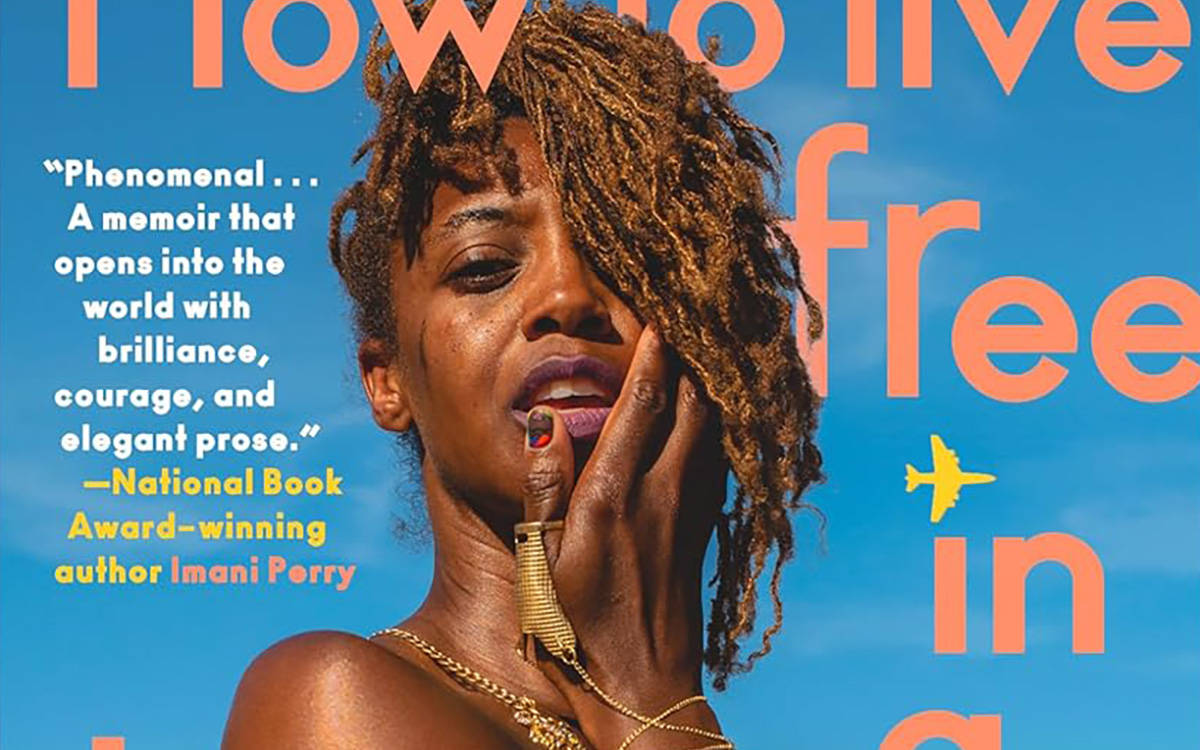
‘How to Live Free in a Dangerous World: A Decolonial Memoir’
By Shayla Lawson
c.2024, Tiny Reparations Books
$29/320 pages
Do you really need three pairs of shoes?
The answer is probably yes: you can’t dance in hikers, you can’t shop in stilettos, you can’t hike in clogs. So what else do you overpack on this long-awaited trip? Extra shorts, extra tees, you can’t have enough things to wear. And in the new book “How to Live Free in a Dangerous World” by Shayla Lawson, you’ll need to bring your curiosity.

Minneapolis has always been one of their favorite cities, perhaps because Shayla Lawson was at one of Prince’s first concerts. They weren’t born yet; they were there in their mother’s womb and it was the first of many concerts.
In all their travels, Lawson has noticed that “being a Black American” has its benefits. People in other countries seem to hold Black Americans in higher esteem than do people in America. Still, there’s racism – for instance, their husband’s family celebrates Christmas in blackface.
Yes, Lawson was married to a Dutch man they met in Harlem. “Not Haarlem,” Lawson is quick to point out, and after the wedding, they became a housewife, learned the language of their husband, and fell in love with his grandmother. Alas, he cheated on them and the marriage didn’t last. He gave them a dog, which loved them more than the man ever did.
They’ve been to Spain, and saw a tagline in which a dark-skinned Earth Mother was created. Said Lawson, “I find it ironic, to be ordained a deity when it’s been a … journey to be treated like a person.”
They’ve fallen in love with “middle-American drag: it’s the glitteriest because our mothers are the prettiest.” They changed their pronouns after a struggle “to define my identity,” pointing out that in many languages, pronouns are “genderless.” They looked upon Frida Kahlo in Mexico, and thought about their own disability. And they wish you a good trip, wherever you’re going.
“No matter where you are,” says Lawson, “may you always be certain who you are. And when you are, get everything you deserve.”
Crack open the front cover of “How to Live Free in a Dangerous World” and you might wonder what the heck you just got yourself into. The first chapter is artsy, painted with watercolors, and difficult to peg. Stick around, though. It gets better.
Past that opening, author Shayna Lawson takes readers on a not-so-little trip, both world-wide and with observant eyes – although it seems, at times, that the former is secondary to that which Lawson sees. Readers won’t mind that so much; the observations on race, beauty, love, the attitudes of others toward America, and finding one’s best life are really what takes the wheel in this memoir anyhow. Reading this book, therefore, is not so much a vacation as it is a journey of discovery and joy.
Just be willing to keep reading, that’s all you need to know to get the most out of this book. Stick around and “How to Live Free in a Dangerous World” is what to pack.
The Blade may receive commissions from qualifying purchases made via this post.
Books
Story of paralysis and survival features queer characters
‘Unswerving: A Novel’ opens your eyes and makes you think
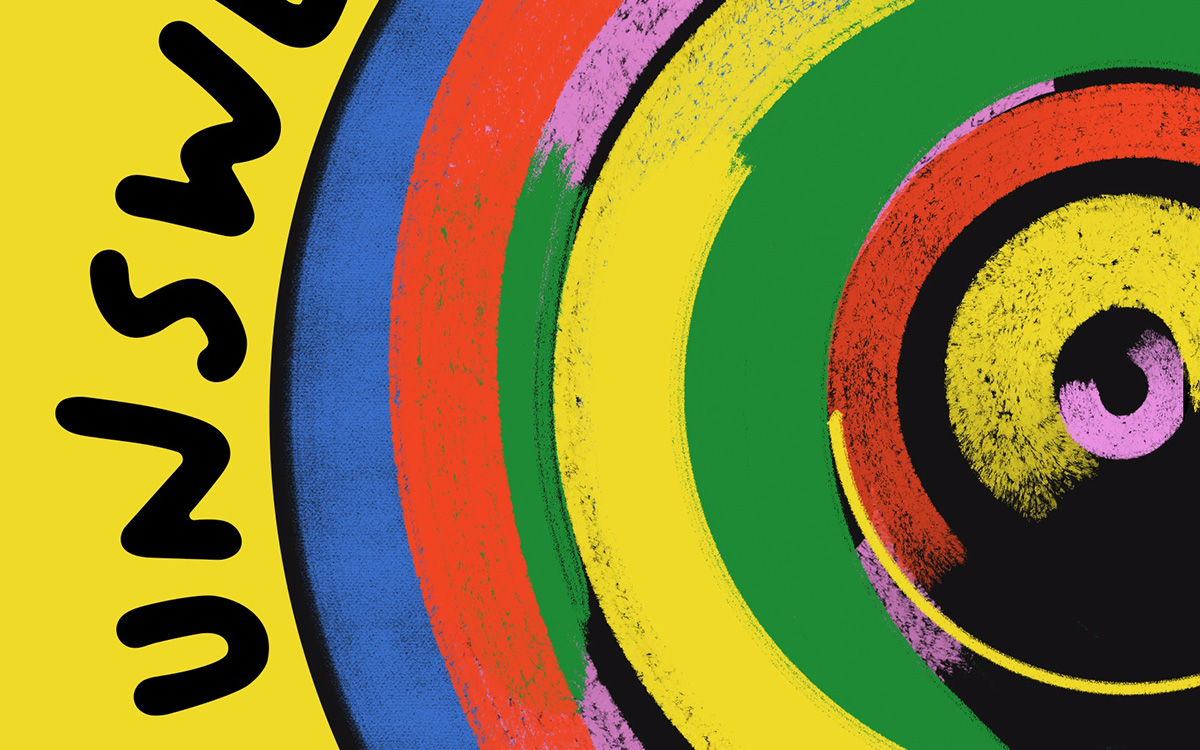
‘Unswerving: A Novel’
By Barbara Ridley
c.2024, University of Wisconsin Press
$19.95 / 227 pages
It happened in a heartbeat.
A split-second, a half a breath, that’s all it took. It was so quick, so sharp-edged that you can almost draw a line between before and after, between then and now. Will anything ever be the same again? Perhaps, but maybe not. As in the new book “Unswerving” by Barbara Ridley, things change, and so might you.

She could remember lines, hypnotizing yellow ones spaced on a road, and her partner, Les, asleep in the seat beside her. It was all so hazy. Everything Tave Greenwich could recall before she woke up in a hospital bed felt like a dream.
It was as though she’d lost a month of her life.
“Life,” if you even wanted to call it that, which she didn’t. Tave’s hands resembled claws bent at the wrist. Before the accident, she was a talented softball catcher but now she could barely get her arms to raise above her shoulders. She could hear her stomach gurgle, but she couldn’t feel it. Paralyzed from the chest down, Tave had to have help with even the most basic care.
She was told that she could learn some skills again, if she worked hard. She was told that she’d leave rehab some day soon. What nobody told her was how Les, Leslie, her partner, girlfriend, love, was doing after the accident.
Physical therapist Beth Farringdon was reminded time and again not to get over-involved with her patients, but she saw something in Tave that she couldn’t ignore. Beth was on the board of directors of a group that sponsored sporting events for disabled athletes; she knew people who could serve as role models for Tave, and she knew that all this could ease Tave’s adjustment into her new life. It was probably not entirely in her job description, but Beth couldn’t stop thinking of ways to help Tave who, at 23, was practically a baby.
She could, for instance, take Tave on outings or help find Les – even though it made Beth’s own girlfriend, Katy, jealous.
So, here’s a little something to know before you start reading “Unswerving”: author Barbara Ridley is a former nurse-practitioner who used to care for patients with spinal cord injuries. That should give readers a comfortable sense of satisfaction, knowing that her experiences give this novel an authenticity that feels right and rings true, no faking.
But that’s not the only appeal of this book: while there are a few minor things that might have readers shaking their heads (HIPAA, anyone?), Ridley’s characters are mostly lifelike and mostly likable. Even the nasties are well done and the mysterious character that’s there-not-there boosts the appeal. Put everyone together, twist a little bit to the left, give them some plotlines that can’t ruined by early guessing, and you’ve got a quick-read novel that you can enjoy and feel good about sharing.
And share you will because this is a book that may also open a few eyes and make readers think. Start “Unswerving” and you’ll (heart) it.
The Blade may receive commissions from qualifying purchases made via this post.
Books
Examining importance of queer places in history of arts and culture
‘Nothing Ever Just Disappears’ shines with grace and lyrical prose
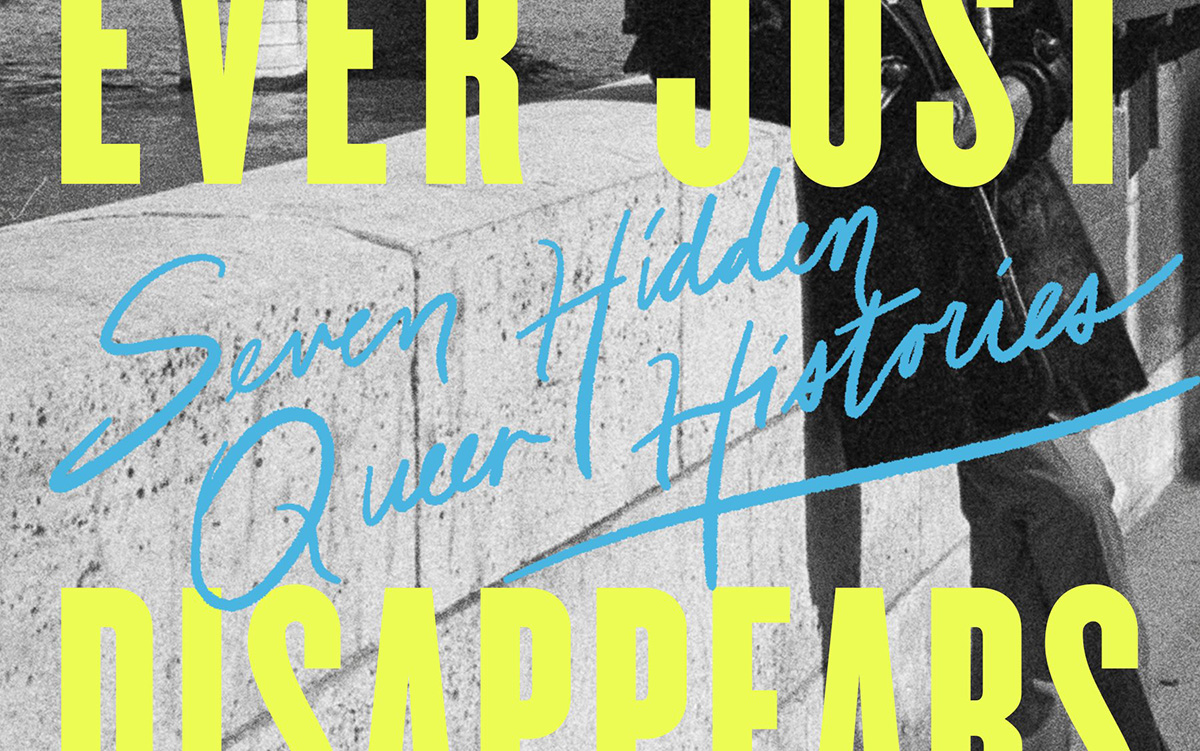
‘Nothing Ever Just Disappears: Seven Hidden Queer Histories’
By Diarmuid Hester
c.2024, Pegasus Books
$29.95/358 pages
Go to your spot.
Where that is comes to mind immediately: a palatial home with soaring windows, or a humble cabin in a glen, a ramshackle treehouse, a window seat, a coffeehouse table, or just a bed with a special blanket. It’s the place where your mind unspools and creativity surges, where you relax, process, and think. It’s the spot where, as in the new book “Nothing Ever Just Disappears” by Diarmuid Hester, you belong.

Clinging “to a spit of land on the south-east coast of England” is Prospect Cottage, where artist and filmmaker Derek Jarman lived until he died of AIDS in 1994. It’s a simple four-room place, but it was important to him. Not long ago, Hester visited Prospect Cottage to “examine the importance of queer places in the history of arts and culture.”
So many “queer spaces” are disappearing. Still, we can talk about those that aren’t.
In his classic book, “Maurice,” writer E.M. Forster imagined the lives of two men who loved one another but could never be together, and their romantic meeting near a second-floor window. The novel, when finished, “proved too radical even for Forster himself.” He didn’t “allow” its publication until after he was dead.
“Patriarchal power,” says Hester, largely controlled who was able to occupy certain spots in London at the turn of the last century. Still, “queer suffragettes” there managed to leave their mark: women like Vera Holme, chauffeur to suffragette leader Emmeline Pankhurst; writer Virginia Woolf; newspaperwoman Edith Craig, and others who “made enormous contributions to the cause.”
Josephine Baker grew up in poverty, learning to dance to keep warm, but she had Paris, the city that “made her into a star.” Artist and “transgender icon” Claude Cahun loved Jersey, the place where she worked to “show just how much gender is masquerade.” Writer James Baldwin felt most at home in a small town in France. B-filmmaker Jack Smith embraced New York – and vice versa. And on a personal journey, Hester mourns his friend, artist Kevin Killian, who lived and died in his beloved San Francisco.
Juxtaposing place and person, “Nothing Ever Just Disappears” features an interesting way of presenting the idea that both are intertwined deeper than it may seem at first glance. The point is made with grace and lyrical prose, in a storyteller’s manner that offers back story and history as author Diarmuid Hester bemoans the loss of “queer spaces.” This is really a lovely, meaningful book – though readers may argue the points made as they pass through the places included here. Landscapes change with history all the time; don’t modern “queer spaces” count?
That’s a fair question to ask, one that could bring these “hidden” histories full-circle: We often preserve important monuments from history. In memorializing the actions of the queer artists who’ve worked for the future, the places that inspired them are worth enshrining, too.
Reading this book may be the most relaxing, soothing thing you’ll do this month. Try “Nothing Ever Just Disappears” because it really hits the spot.
The Blade may receive commissions from qualifying purchases made via this post.
-

 District of Columbia3 days ago
District of Columbia3 days agoCatching up with the asexuals and aromantics of D.C.
-

 State Department5 days ago
State Department5 days agoState Department releases annual human rights report
-

 South America3 days ago
South America3 days agoArgentina government dismisses transgender public sector employees
-

 Maine4 days ago
Maine4 days agoMaine governor signs transgender, abortion sanctuary bill into law

